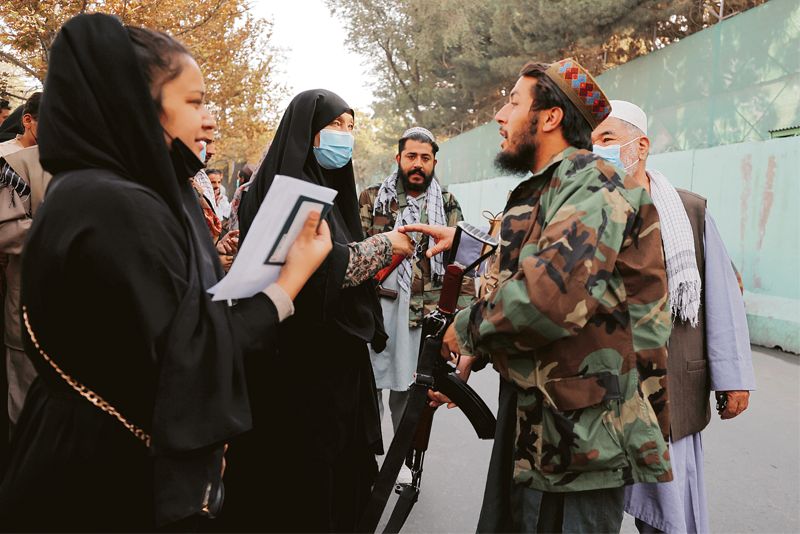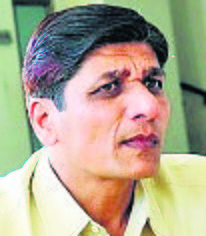
ALARMING: The Taliban takeover of Afghanistan has laid bare women’s vulnerabilities. Reuters
Bharat H. Desai
Jawaharlal Nehru Chair & Professor of international Law, JNU
ON October 21, the United Nations Security Council (UNSC), under the presidentship of Kenya’s Foreign Affairs Secretary Raychelle Omamo, held an open ministerial debate on women, peace and development (WPS). It was led by Secretary-General António Guterres. The UN Women Executive Director, Sima Sami Bahous, and Special Envoy of the Chairperson of the African Union WPS Commission Bineta Diop were in attendance.
The October 13 concept note circulated by Kenya sought the open debate to focus on the theme ‘Investing in Women in Peacekeeping and Peacebuilding’. It has come after the 20th anniversary (October 2020) of the UNSC’s WPS resolution 1325.
In the wake of violent conflicts raging around the world, the UNSC debate assumed significance since 100 million people now experience food insecurity and unprecedented 82.4 million people are forcibly displaced. Now a growing number of studies indicate a link between sex and gender inequality and violent outcomes.
In his seminal report of September 27, 2021, the Secretary-General called on member states to implement measures to increase women’s equal participation in peace, political and other decision-making processes. There is a huge global gender gap wherein only 23 per cent of women delegates took part in the UN-led peace processes, 5.2 per cent women in military troops in peace operations, they held only 18.9 per cent of the parliamentary seats in conflict-ridden countries and the bilateral aid to women’s rights organisations in these countries has gone below 1 per cent.
The August 15 takeover of Afghanistan by the Taliban came in the aftermath of a record number of women killed, including civil society activists, journalists, academics, vaccinators and judges. No Afghan woman was included among the negotiators in the Doha talks with the Taliban in 2020 and the Moscow talks in March 2021.
The goal of ensuring that peace agreements address the rights, concerns and perspectives of all women regardless of their ethnicity, race, sexual orientation, age or religion still remains elusive. None of the ceasefire agreements reached between 2018 and 2020 included gender provisions or the prohibition of sexual violence. It seems gender equality is a question of power and the Secretary-General’s 2021 report has clearly spelled out persistent gaps and stagnation in women’s participation in political leadership, peace and security, access to economic resources and decision-making.
Sexual and gender-based violence (SGBV) prevails from time immemorial. SGBV is still a taboo, spoken about in whispers and suffered in silence. It takes place during peacetime, conflicts and post-conflict situations. SGBV against women is historically rooted in patriarchal systems, stereotyped gender-based norms and harmful cultural practices (HCPs). As a corollary, the control over female sexuality is central to the social, cultural and State-driven global normative systems. For instance, in 2021 alone, 4.16 million girls around the world are at risk of undergoing FGM (female genital mutilation). In the wake of the Covid-19 pandemic and climatic change, there has been an exacerbation of SGBV against women. This presents a new regulatory challenge for international law, international institutions and scholars.
The growing scholarly works and heightened multi-agency coordination show a healthy trend in addressing the SGBV challenge. Ironically, the existing corpus of international law is not adequate in specifically addressing SGBV against women and it requires global specialisation for bridging the ‘normative gap’ in the field. The absence of specific legally binding instruments has relevance for effectiveness and coordination in the roles of international institutions such as the International Committee of the Red Cross (ICRC), UN Women, UN Office of the High Commissioner for Human Rights and the UN Human Rights Council. The soft law instruments hitherto used by these agencies are not taken seriously by most of the States, which construe them as guiding principles.
International institutions (IIs) have been playing a pivotal role in providing legal and institutional protection to women against SGBV. It is vital in the prevention and elimination of SGBV as a threat and reality against a sizeable part of the global population. Most of such IIs work under the UN umbrella.
“Sexual and gender-based violence is a heinously prevalent scourge, too common in all societies. It is also exacerbated by conflict, as well as other humanitarian crises and the climate emergency,” Peter Maurer, president of the ICRC Geneva, has said.
Notwithstanding the stated objectives of all legally binding agreements, soft instruments and concerted actions of international institutions, women continue to suffer SGBV, primarily because of their gender. SGBV remains globally prevalent with destructive consequences for women due to their status in societies, its use as a weapon of war and the perpetrators mostly going scot-free. In view of this and as international law is struggling to address the SGBV challenge, an important ideational issue needs to be grappled with. Is it possible to de-stigmatise and de-legitimise SGBV? This crucial question presents a big challenge for the future.
In his fourth address to the UN General Assembly on September 25, Prime Minister Narendra Modi, referring to the Taliban takeover in Afghanistan, alluded to the problem of ‘regressive thinking’ that leads to the use of terrorism as ‘a political tool’. The PM urged the UN to speed up the reforms process that has been flagging for more than a decade, which would include an expanded Security Council.
India needs to take the lead in gender equality with linkage between agendas of WPS and maintenance of international peace and security. It needs to go beyond the June 2 statement of First Secretary Vidisha Maitra wherein she said that “meaningful participation of women in decision-making substantially strengthens prevention efforts, deepens the effectiveness of peace-building and develops stability in society.”
India needs to push for effective integration of WPS considerations, especially by including the list of “terrorist entities involved in violence against women in armed conflicts.” During the UNSC term till December 2022, India needs to rely upon cutting-edge, home-grown scholarly works to add greater value, urgency and shape to the UNSC agenda on WPS. It will yield rich dividends for India’s claims for the UNSC permanent seat and to be heard on the global high table.
Join Whatsapp Channel of The Tribune for latest updates.




























